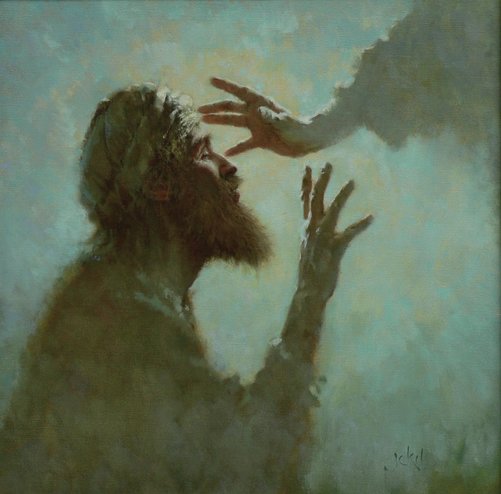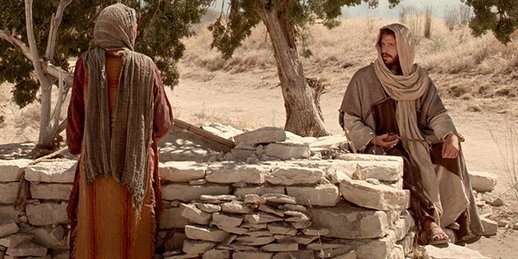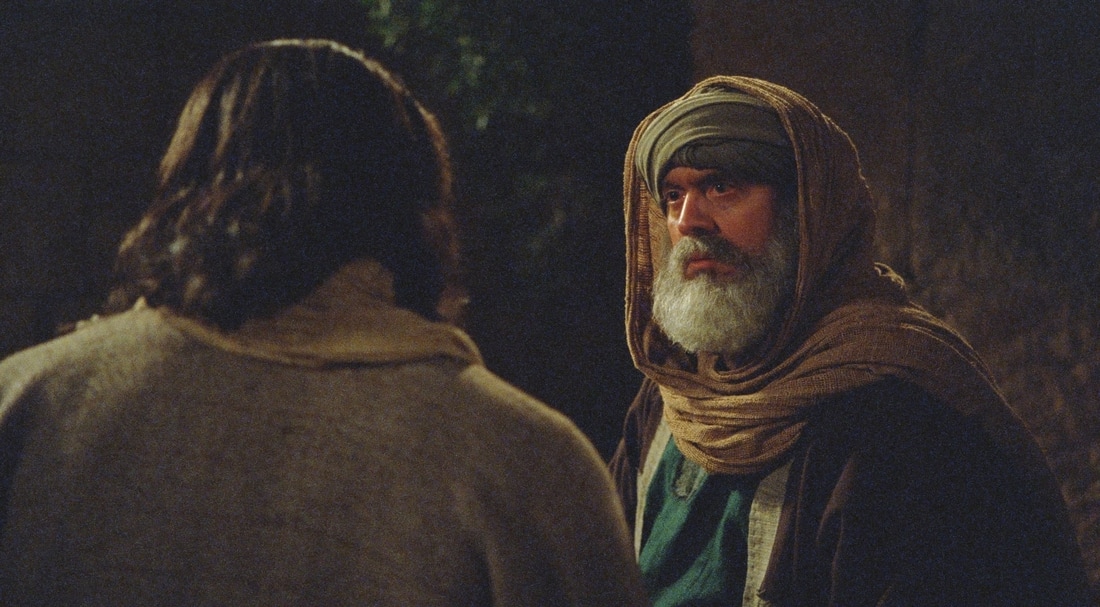John 9:1-41

Today we have another long story from John’s Gospel (Ch. 9). It’s not merely an allegory or an object lesson. It’s a real account of the miraculous healing power of the Son of God, something John calls a “sign” because it points beyond itself to the Person of Jesus. It’s a witness to His deity and to His fulfillment of prophecy.
There’s something compelling that’s buried in the story line, and we might miss it. The parents of this man born blind, when put on the line to testify about their son, refuse to be lights bearing witness to the Light of Christ. Why? Because they fear losing their place in the temple, being “put out,” the Jewish equivalent of excommunication. They fear rejection and exclusion from their worship and their entire society.
What does the blind man himself do? He not only bears witness to the Light, he directly challenges his questioners, facetiously asking whether they, too, wish to become disciples of Jesus, and testifying that “If this man were not from God, He could do nothing.” And what’s the consequence of his witness? He immediately is put out, excommunicated. Perhaps there’s a double meaning, as the Pharisees, by putting him out of the temple, may also be attempting to put out the light of his persistent witness to Jesus. He embraced rejection in order to testify of what Jesus had done for him.
Then what happened? Jesus sought him out, revealed Himself to him, and led him to his declaration of faith: “Lord, I believe.” And John tells us that “he worshiped Him.” If this were a made-up story John might have thrown in at least a few of the Pharisees saying, “We, too, believe in Jesus and want to be His followers.” But John faithfully records only their sarcastic rejoinder to Jesus, “Are we blind, too?” Why did they hold on to their blindness against the powerful witness of this sign, the testimony of the man and their face-to-face encounter with Jesus? We have Paul’s answer in II Corinthians: “The god of this world has blinded the minds of the unbelieving so that they might not see the light of the gospel of the glory of Christ, who is the image of God” (4:4).
The tragic answer to the Pharisees is, “Yes, you, too, are indeed blind.” Both the physical and spiritual blindness of the man born blind were cured when he encountered Jesus, and he moved quickly from declaring Jesus to be a prophet to accepting him as the Son of Man and saying, “Lord, I believe.” But the parting words of Jesus to the Pharisees are, “since you say, ‘We see,’ your sin remains.”
Should they have known better? What did Jesus think? Just a few chapters earlier in John’s Gospel we find Jesus saying, “if you believed Moses, you would believe Me, for he wrote about Me” (John 5:47). And Luke tells us about two post-resurrection appearances of Jesus, first to two of His disciples on the road to Emmaus when, “beginning with Moses and with all the prophets, He explained to them the things concerning Himself in all the Scriptures” (Luke 24:27). Then, later in the same chapter, Luke tells about another time that the risen Jesus is meeting with all of His disciples and He says, “All things which are written about Me in the Law of Moses and the Prophets and the Psalms must be fulfilled” (Luke 24:44). Jesus expected His hearers to connect the dots.
I gladly would have skipped seminary altogether to be in on either of those sessions with Jesus when he took His disciples through the Scriptures. But then again, we have all the Scriptures at our instant disposal and, reading them with the eye of faith, we can find them to be replete with prophetic references to Jesus. If we need any help, hundreds of books have been written on the subject from the earliest Church Fathers to the present. And we also have the illuminating witness of the Holy Spirit.
In the context of today’s Gospel we cannot help but think of the witness of Isaiah (35:4b-6a): “Your God will... come and save you. Then shall the eyes of the blind be opened, and the ears of the deaf unstopped. Then shall the lame man leap as an hart, and the tongue of the dumb sing.” Every bit of this and much more was fulfilled in the ministry of Jesus, the One Who, “coming into the world, enlightens every man” (John 1:9), the One Whose light we’re commissioned to share wherever we go.
In the Sermon on the Mount, Jesus tells us, “You are the light of the world” (Matthew 5:14). In today’s reading in John’s Gospel, Jesus says, “I am the Light of the World” (John 9:5). And Paul, in our reading from Ephesians, provides the perfect synthesis of the two: “You are light in the Lord” (5:8). There’s something wonderfully reassuring about this, because being the light of the world on our own would be a tall order and, for many, an unwelcome responsibility. What shrinking violet would welcome being the light of the world? But we see that Jesus’ appellation does not require some personality trait we may not possess. What He really is saying is that our light is His light, and this gives a very different spin. We can say that we‘re the moon to Jesus’ sun, though it may be much more than that. The moon provides only reflected light, whereas we are to allow the Light of Christ to shine through us in a manner that draws others to Him.
When it’s no longer our light but His that we let shine, then we can put into practice the commandment of Jesus, “Let your light so shine before others, that they may see your good works and give glory to your Father Who is in heaven” (Matthew 5:16). Light is meant to characterize us: we are to be known as “children of light,” as Paul identifies us in Ephesians (5:8). But, again, it’s not about us: it’s all about Jesus Christ and His light. Paul also wrote, “For God, Who said, ‘Light shall shine out of darkness,’ is the One who has shone in our hearts to give the Light of the knowledge of the glory of God in the face of Christ. But we have this treasure in earthen vessels, so that the surpassing greatness of the power will be of God and not from ourselves” (II Cor. 4:6, 7).
Where does this leave us? For starters, it leaves us in a place of profound humility, recognizing that we who were children of darkness have been brought into His inexpressible light, and not by any merit that’s inherently our own. “The surpassing greatness of the power will be of God and not from ourselves.” Then, importantly, it brings us to a place where we acknowledge that our witness to that light in a world that remains in darkness is not optional. It’s to be part of our identity that’s now complete in Christ (Colossians 2:10). We no longer live to ourselves (II Corinthians 5:15), but to Him Who has re-made us in His very own image (Romans 8:29, II Corinthians 3:18). Jesus said, “Believe in the light while you have the light, so that you may become children of light” (John 12:36). We are to be His witnesses in every part of the world, but especially in those parts that we ourselves inhabit each and every day.
How are we doing with that? What happens when our witness to Christ is not received well by others as true light? Should we be surprised at all? Does it mean that we’re failures when it comes to being the light of the world? No, quite the contrary, we should say, “It’s just as both Jesus and Paul told us it would be, predicated on their own experiences.” As we saw before, Paul wrote, “the god of this world has blinded the minds of the unbelieving so that they might not see the light of the gospel of the glory of Christ, who is the image of God” (II Corinthians 4:4).
Does it sound as though we should consider throwing in the towel? No, because we are no longer our own. We’ve been bought with a price, the price of Jesus’ broken Body and shed Blood, so that we might be His servants (I Corinthians 6:19, 20), His lights, and thereby fulfill not His request but His final marching orders to be His “witnesses both” at home and nearby, “and even to the remotest part of the earth” (Acts 1:8). Those were His final words to His disciples before His ascension. He did not offer “giving up” as a Plan B, nor did He suggest the option of just keeping quiet. Rather, He said, “You shall be witnesses of Me.” “You are the light of the world. A city set on a hill cannot be hid” (Matthew 5:14).
What are the things that prevent us from being light to our world?
One certainly is letting ourselves get in the way, thereby obscuring the light that is meant to be His and not ours.
Another is our lacking the faith to believe that we actually could be instruments of God’s peace and love in our spheres of influence.
Another is our lack of conviction that the light we have is indeed the Light of the World, the true Light, the only Light that, through our instrumentality, enlightens every person coming into the world.
Another is the tragic fact that too few of us really believe that those who dwell in darkness without the Light are doomed to live eternally without it.
When we withhold the witness we’re called to provide, we thwart the fulfillment of Isaiah’s prophecy that “The people who walk in darkness will see a great light; those who live in a dark land, on them will the light shine” (9:2). We have a story to tell. We have many stories to tell. All of us have our own stories to tell. But the greatest story of all is the one most succinctly summarized by Paul in II Corinthians 5:19: “God was in Christ reconciling the world to Himself.” That’s how God chose to effect His salvation.
If each one of us would shout out only that briefest of testimonies, then the Light of Christ Who is the Light of the World would shine in His brightness and dispel at least some of the darkness of this world. Jesus said, “Walk while you have the Light, so that darkness will not overtake you” (John 12:35). And John said of Jesus, “The Light shines in the darkness, and the darkness cannot extinguish it” (John 1:5). That Light still shines through us into a dark world that never has needed it more. May we not fail to be among those through whom the Light of Christ shines most brightly.
In the Name of the Father and of the Son and of the Holy Spirit, Amen




 RSS Feed
RSS Feed


